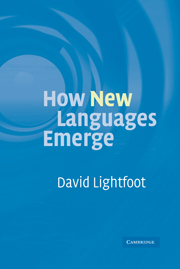Book contents
- Frontmatter
- Contents
- Preface
- 1 Internal languages and the outside world
- 2 Traditional language change
- 3 Some properties of language organs
- 4 Languages emerging in children
- 5 New E-language cuing new I-languages
- 6 The use and variation of grammars
- 7 The eruption of new grammars
- 8 A new historical linguistics
- References
- Index
8 - A new historical linguistics
Published online by Cambridge University Press: 02 February 2010
- Frontmatter
- Contents
- Preface
- 1 Internal languages and the outside world
- 2 Traditional language change
- 3 Some properties of language organs
- 4 Languages emerging in children
- 5 New E-language cuing new I-languages
- 6 The use and variation of grammars
- 7 The eruption of new grammars
- 8 A new historical linguistics
- References
- Index
Summary
Language change, contingency, and new systems
So languages change, both I-languages and E-language. There is a deep interrelationship and new languages are always emerging, of both kinds. Adults and children both play roles. The perspective we have developed, particularly the distinction between external E-language and individual I-languages, recasts matters of the role of children and adults, the gradualness of change, directionality, the spread of changes through populations, explanation, and other issues that have been central for traditional historical linguistics; see Janda & Joseph (2003) for a recent survey.
E-language, a group phenomenon, language out there, is amorphous and in constant flux. No two people are exposed to the same E-language and everybody hears different things. E-language is in flux because people say different things and use their grammars differently, both differently from other people and differently themselves over time. Some people use certain constructions provided by their I-language more or less frequently than others, and more or less frequently than themselves at other times or in different contexts. There may be whims and fashions, whereby people take on the speech forms of public figures, popular singers, politicians, or comedians, and certain expressions take on new forces or come to be used more or less frequently. Furthermore, people's speech may change through their lifetime, as one can see by looking at one's own letters written over a period of years.
- Type
- Chapter
- Information
- How New Languages Emerge , pp. 161 - 185Publisher: Cambridge University PressPrint publication year: 2006



